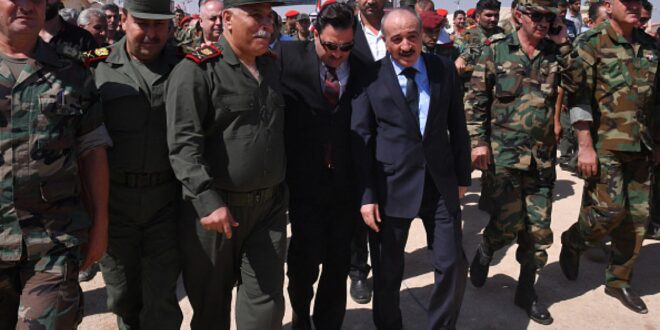The Emirati head of Interpol Maj Gen Ahmed Nasser Al-Raisi has been spotted posing for a photo with Syrian regime Interior Minister Mohammed Khaled Al-Rahmoun who is on multiple sanction lists for his role in the brutal suppression of domestic political dissent.
Several Syria analysts and activists shared the photo of Raisi and the notorious Syrian figure, whose regime has disappeared around 135,000 political prisoners.
“[Rahmoun]’s been sanctioned for years of war crimes – including overseeing the infamous “Branch of Death” in #Harasta, where tens of thousands were detained & tortured to death since 2011,” Charles Lister, a Washington-based analyst who heads the Middle East Institute, posted on X in reaction to the pictures.
Raisi, a police officer, has also been the focus of controversy due to the UAE’s own human rights record since his 2021 election as the head of Interpol, which was denounced by human rights bodies.
Complaints, accusing Raisi of torture, were filed in Turkey and France before his election.
According to the Syrian state news agency SANA, the two men met on the sidelines of the 41st session of the Arab Interior Ministers Council taking place this week in Tunis gathering officials from Saudi Arabia, the UAE, Kuwait, Bahrain, Tunisia, Iraq, Yemen, Lebanon, Palestine, Qatar and Jordan.
Nothing to see here... Just @INTERPOL_HQ engaging with #Assad's Interior Minister, Mohammed Rahmoun.
He's been sanctioned for years of war crimes -- incl. overseeing the infamous "Branch of Death" in #Harasta, where tens of thousands were detained & tortured to death since 2011. https://t.co/S1wCN597nl — Charles Lister (@Charles_Lister) February 27, 2024Born in 1957 in Idlib province, northwestern Syria, Rahmoun initially served as a major general in the Syrian army before transitioning to politics. He notably led the Political Security Directorate, a prominent intelligence agency known for its surveillance of Syria’s civilian population, particularly targeting opposition to the Assad regime.
He was appointed minister of interior in November 2018 but was sanctioned by the US as early as 2017.
Since 2019, his name has also appeared on various European, UK, Canadian and Swiss sanctions lists and travel bans have been issued for his role in the Syrian regime’s brutal repression of political dissent.
Syria has been a member of Interpol since 1953 but in 2012, after the mass killing and detention of protesters, it faced “corrective measures” limiting the regime’s access to the global police body’s databases.
These restrictions were lifted in 2021, sparking outcry from human rights groups and Syrian activists fearing it would open the door to further harassment and abuse of opposition figures and refugees.
The body said at the time that “the decision to lift the corrective measures was based on INTERPOL’s rules and does not reflect any position by INTERPOL on recent events concerning Syria.”
The Syrian war erupted in early 2011 when Assad’s forces staged a brutal crackdown on anti-regime protests, triggering an armed rebellion fuelled by mass defections from the Syrian army.
Hundreds of thousands of civilians have been killed in the war, mostly by the regime and its powerful allies, and millions have been displaced both inside and outside of Syria.
The brutal tactics pursued by the regime, which have included the use of chemical weapons, sieges, mass executions and torture against civilians, have led to war crimes investigations.
This has not stopped Interpol from continuing to provide apparent support for the regime.
“As a global law enforcement organization, INTERPOL provides a neutral platform for police to work directly with their counterparts, even between countries which do not have diplomatic relations,” INTERPOL says on its Syria page.
 Eurasia Press & News
Eurasia Press & News




